b2m4动名词做宾语)外研版必修二第四模块语法
高中英语外研版必修二module4 知识点
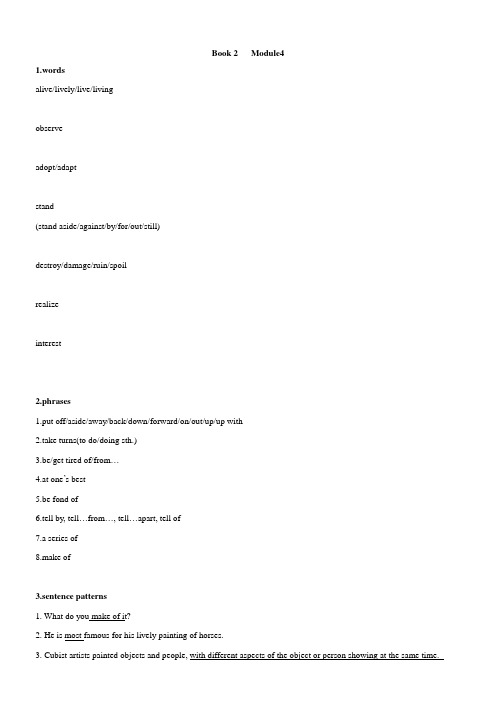
Book 2 Module41.wordsalive/lively/live/livingobserveadopt/adaptstand(stand aside/against/by/for/out/still)destroy/damage/ruin/spoilrealizeinterest2.phrases1.put off/aside/away/back/down/forward/on/out/up/up with2.take turns(to do/doing sth.)3.be/get tired of/from…4.at one’s best5.be fond of6.tell by, tell…from…, tell…apart, tell of7.a series of8.make of3.sentence patterns1. What do you make of it?2. He is most famous for his lively painting of horses.3. Cubist artists painted objects and people, with different aspects of the object or person showing at the same time.4.grammar items-ing/to do5.exercises1. The streets are ____ with people. A. live B. lively C. living D. alive2. Many people observed the thief ______ something from the lady’s bag, but no one stop him ____ that.A. steal; to doB. to steal; doingC. stealing; doD. steal; doing3. During his stay in China, Tom _______ a great interest in Chinese kungfu.A. inventedB. developedC. madeD. discovered4. The students ______ in the exam will be strictly punished in our school.A. caught cheatingB. catches cheatedC. caught cheatD. catching cheating5. Have you any difficulty in ______ the problem? A. to solve B. solved C. solving D. for solving6. You can not _____him _____a selfish man though he looks cold.A. consider; beB. look on; to beC. think of; withD. consider; \7. ---What were you doing when I phoned you?---I had just finished my homework and ______ to take a bath.A. startedB. has startedC. was startingD. had started8. The chair looks rather hard, but in fact it is very comfortable to _______.A. sittingB. to sit onC. to sitD. being sat on9. _________working all day long, he fell asleep as soon as he lay on the bed.A. Getting tired ofB. Getting tired fromC. To get tried ofD. To get tired from10. She didn’t feel happy_____ in a block of apartments. She’d rather ______ in a traditional house.A. living; to liveB. living; liveC. to live; livingD. to live; live11. _____ in the dark, his head hit against a tree.A. WalkingB. He was walkingC. WalkedD. When he was walking12. Our teacher always says I am a ______ student.A. to promiseB. promiseC. promisedD. promising13. It’s no use _______ him ______ doing that.A. to persuade; to stopB. persuading; to stopC. to persuade; stoppingD. persuading; stopping15. ----You were brave enough to say no to him. ----Well, I will never regret _____that.A. to doB. having doneC. to be doingD. to have done16. She observed a man _______ on the opposite side of the way. A. walking B. walk C. walked D. to walk.17. Finally I ______ her idea, that’s to say, I should _____ myself to the new circumstance here at first.A. adopted; adaptB. adapted; adoptedC. adopted; adoptedD. adapted; adapt.18. He _______ at the target and hit it. A. looked B. shouted C. aimed D. laughed19. She can’t_________ having nothing to do. A. stand B. lie C. seat D. run.20. They took turns _____ singing songs and reciting poems. A. by B. to C. for D. in21. They ______ the train until it disappeared in the distance. A. saw B. watched C. noticed D. observed.22. The students at the back of the classroom looked forward _____ what was happening, but none of them foundanything unusual . A. to seeing B. to look C. to see D. to looking23.-------- What have you been busy doing recently? ------- _________ piano.A. To practice playing theB. Practicing to playC. Practicing playing theD. Having practiced playing.24. What he said ______ the students.A. was interested inB. was interesting inC. was interested toD. interested25. Was it ______ he said or something that he did _______ you were angry at so much?A. that; whichB. what; thatC. that, whatD. what , \26. She sat there_______, with tears ______- down her cheeks.A. alone; to runB. lonely; to runC. alone; runningD. lonely; running.27. I would appreciate _____ back this afternoon.A. you to callB. you callC. your callingD. you’re calling28. Charles Babbage is generally considered _____ the first computer.A. to inventB. inventingC. having inventedD. to have invented29. The people of Beijing have ____ an interest _____ learning English as a result of the successful bid (申办) for the 2008 Olympic Games.A. developed; inB. found; onC. discovered; ofD. to have invented30. --- You’ve done a very good job. I’m quite satisfied. --- _______A. We could have done better.B. Do you think so?C. Thanks for your compliment.D. You must be joking.31. --- What do you _____ the film Shark? ---More than exciting!A. find outB. consider asC. deal withD. make of32. He ____ his work with animals. A. is famous as B. is famous for C. is well known as D. is well known to33. After years of hard work, his dream has ______.A. realizedB. become a realityC. turned into realitiesD. been realistic34. Considering it a bad influence on her, the teacher found an excuse for ___ telling her the news.A. putting offB. succeed inC. look forward toD. be fond of35. ______, when he was already ______, he started to learn painting.A. In the 1980; thirtiesB. In the 1980’s; in his thirtiesC. In the 1990; in thirtiesD. In 1990’s; in h is thirties。
必修二module4知识点讲解
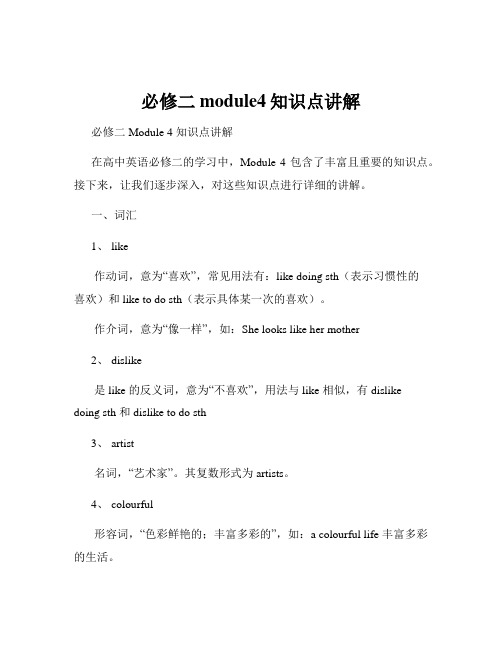
必修二module4知识点讲解必修二 Module 4 知识点讲解在高中英语必修二的学习中,Module 4 包含了丰富且重要的知识点。
接下来,让我们逐步深入,对这些知识点进行详细的讲解。
一、词汇1、 like作动词,意为“喜欢”,常见用法有:like doing sth(表示习惯性的喜欢)和 like to do sth(表示具体某一次的喜欢)。
作介词,意为“像一样”,如:She looks like her mother2、 dislike是 like 的反义词,意为“不喜欢”,用法与 like 相似,有 dislike doing sth 和 dislike to do sth3、 artist名词,“艺术家”。
其复数形式为 artists。
4、 colourful形容词,“色彩鲜艳的;丰富多彩的”,如:a colourful life 丰富多彩的生活。
名词,“绘画;油画”。
paint 作动词,意为“绘画;给上油漆”。
6、 scene名词,“景色;风景;场景”,如:a beautiful scene 美丽的景色。
7、 traditional形容词,“传统的”。
tradition 是名词形式,意为“传统”。
8、 alive形容词,“活着的;有活力的”,常作表语。
living 也有“活着的”意思,可作定语。
二、短语1、 be fond of意为“喜欢;喜爱”,与 like 和 love 意思相近,但更强调情感上的喜爱。
例如:He is fond of music 他喜欢音乐。
2、 tell by意为“从可以看出”。
如:You can tell by her expression that she is happy 从她的表情可以看出她很开心。
有“推迟;延期”的意思。
例如:The meeting was put off because of the bad weather 由于天气不好,会议被推迟了。
外研版高中英语必修二Module4知识详解
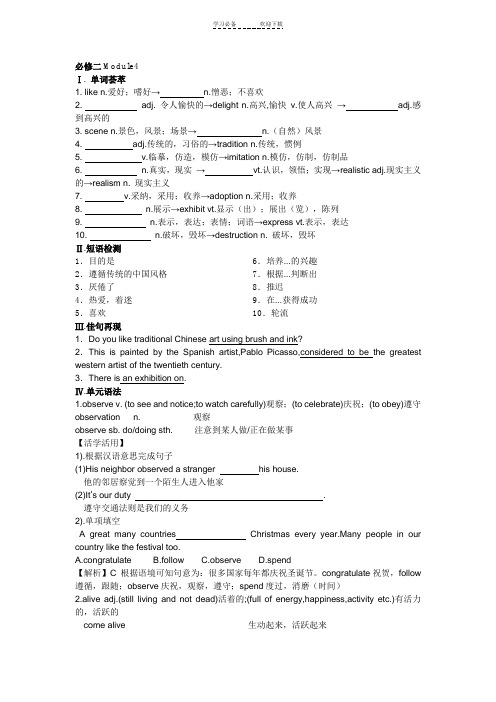
必修二Module4Ⅰ. 单词荟萃1. like n.爱好;嗜好→n.憎恶;不喜欢2. adj. 令人愉快的→delight n.高兴,愉快v.使人高兴→adj.感到高兴的3. scene n.景色,风景;场景→n.(自然)风景4. adj.传统的,习俗的→tradition n.传统,惯例5. v.临摹,仿造,模仿→imitation n.模仿,仿制,仿制品6. n.真实,现实→vt.认识,领悟;实现→realistic adj.现实主义的→realism n. 现实主义7. v.采纳,采用;收养→adoption n.采用;收养8. n.展示→exhibit vt.显示(出);展出(览),陈列9. n.表示,表达;表情;词语→express vt.表示,表达10. n.破坏,毁坏→destruction n. 破坏,毁坏Ⅱ.短语检测1.目的是6.培养...的兴趣2.遵循传统的中国风格7.根据...判断出3.厌倦了8.推迟4.热爱,着迷9.在...获得成功5.喜欢10.轮流Ⅲ.佳句再现1.Do you like traditional Chinese art using brush and ink?2.This is painted by the Spanish artist,Pablo Picasso,considered to be the greatest western artist of the twentieth century.3.There is an exhibition on.Ⅳ.单元语法1.observe v. (to see and notice;to watch carefully)观察;(to celebrate)庆祝;(to obey)遵守observation n. 观察observe sb. do/doing sth. 注意到某人做/正在做某事【活学活用】1).根据汉语意思完成句子(1)His neighbor observed a stranger his house.他的邻居察觉到一个陌生人进入他家(2)It’s our duty .遵守交通法则是我们的义务2).单项填空A great many countries Christmas every year.Many people in our country like the festival too.A.congratulateB.followC.observeD.spend【解析】C 根据语境可知句意为:很多国家每年都庆祝圣诞节。
外研版高中英语选择性必修第二册Unit 4 语法知识点总结汇编

外研版高中英语选择性必修第二册Unit 4 语法知识点总结汇编Unit 4 Breaking boundaries一、重点短语ck n.& vt.缺乏(a) lack of...缺乏……for/through lack of...因缺乏……lack for...(对……)不充足,缺乏……(常用于否定句)have no lack of...不缺乏……lacking adj.缺乏的be lacking in缺乏lack虽可用作及物动词,但不用于被动语态;lack用作不及物动词时,常与介词for或in连用;lack用作名词时,常与介词of连用2.assist vt.协助;帮助assist sb.with sth.在某方面给某人帮助assist sb.in(doing) sth.帮助某人做某事assist sb.to do sth.帮助某人做某事assistance n.[U]帮助,协助,援助with the assistance of在……的帮助下come to sb.’s assistance帮助某人assistant n.助手;助理;售货员lack虽可用作及物动词,但不用于被动语态;lack用作不及物动词时,常与介词for或in连用;lack用作名词时,常与介词of连用3.base vt.以……为根据;把……设在n.基部;基地;基础;根基;底部base...on/upon把……建立在……上be based on/upon以……为根据basis n.基础;基本原则on the basis of根据;在……的基础上basic adj. 基础的;基本的;根本的basically adv.基本上;基本地;主要地Basing an important decision more on emotion than on reason,you will regret it sooner or later.把一个重要的决定更多地建立在情感基础上,而不是以理性思考为基础,你迟早会后悔的。
【素材】外研版必修2第四模块语法讲解
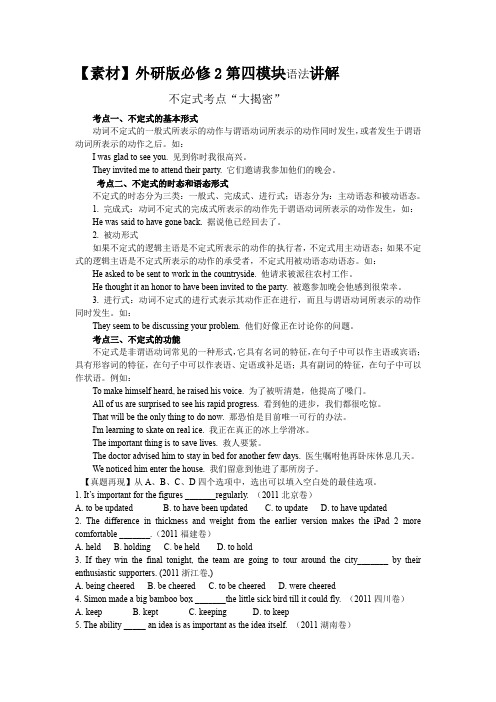
【素材】外研版必修2第四模块语法讲解不定式考点“大揭密”考点一、不定式的基本形式动词不定式的一般式所表示的动作与谓语动词所表示的动作同时发生,或者发生于谓语动词所表示的动作之后。
如:I was glad to see you. 见到你时我很高兴。
They invited me to attend their party. 它们邀请我参加他们的晚会。
考点二、不定式的时态和语态形式不定式的时态分为三类:一般式、完成式、进行式;语态分为:主动语态和被动语态。
1. 完成式:动词不定式的完成式所表示的动作先于谓语动词所表示的动作发生,如:He was said to have gone back. 据说他已经回去了。
2. 被动形式如果不定式的逻辑主语是不定式所表示的动作的执行者,不定式用主动语态;如果不定式的逻辑主语是不定式所表示的动作的承受者,不定式用被动语态动语态。
如:He asked to be sent to work in the countryside. 他请求被派往农村工作。
He thought it an honor to have been invited to the party. 被邀参加晚会他感到很荣幸。
3. 进行式:动词不定式的进行式表示其动作正在进行,而且与谓语动词所表示的动作同时发生。
如:They seem to be discussing your problem. 他们好像正在讨论你的问题。
考点三、不定式的功能不定式是非谓语动词常见的一种形式,它具有名词的特征,在句子中可以作主语或宾语;具有形容词的特征,在句子中可以作表语、定语或补足语;具有副词的特征,在句子中可以作状语。
例如:To make himself heard, he raised his voice. 为了被听清楚,他提高了嗓门。
All of us are surprised to see his rapid progress. 看到他的进步,我们都很吃惊。
外研版必修2模块4语言知识解析

1 MODULE 4 BOOK2 Learning Notes (共15项)词语诠释一、contemporaryZhou Tiehai is regarded as one of the best Chinese contemporary artists. 周铁海被认为是中国当代杰出的艺术家之一。
As a contemporary writer, he puts main attention on exposing current social problems. 作为一名当代作家,他将主要精力放在针砭时弊上。
The composer Salieri was contemporary with Mozart. 萨列里与莫扎特是同时代的人。
Be contemporary with 与…同时代的二、delight1. 用作名词时,表示具体意义的“乐事”,是可数名词;表示抽象意义的“快乐”、“高兴”等,是不可数名词。
如:Travelling is a great delight. 旅行是一件令人愉快的事。
Music gives delight to many people. 音乐给许多人以享受。
To our great delight, the day turned out fine. 使我们高兴的是天气转晴了。
用于短语 take (a) delight in(其中的冠词通常省略)。
如:He takes great delight in painting. 他爱好画画。
2. 用作动词,通常为及物动词,且常用过去分词作表语,比较:I ’m delighted at [b] your success. 我对你的成功感到高兴。
I ’m delighted to hear your success. 我听到你成功的消息感到高兴。
I ’m delighted that you have succeeded. 你获得成功我感到很高兴。
外研版高中英语必修二 Module 4重难点知识归纳总结

外研版高中英语必修二Module 4 Fine Arts — Chinese, Western & Pop Arts 【重点单词】1.like [laik] n. 爱好;嗜好2.dislike [dis'laik] n. 憎恶;不喜欢3.artist ['a:tist] n. 艺术家4.colourful ['kʌləfl] adj. 彩色的5.contemporary [kən'tempərəri] adj. 当代的6.delightful [di'laitfl] adj. 令人愉快的;可爱的7.drawing ['drɔ:iŋ] n. 图画8.paint [peint] vt. 绘画;(用颜料)画9.painter ['peintə] n. 画家10.painting ['peintiŋ] n. 绘画;油画11.scene [si:n] n. 景色;风景12.traditional [trə'diʃnəl] adj. 传统的;习俗的13.alive [ə'laiv] adj. 有活力的;有生气的14.aspect ['æspekt] n. 方面15.imitate ['imiˌteit] vt. 临摹;仿造;模仿;仿效16.observe [əb'zə:v] vt. 观察;注意到17.reality [ri'æləti] n. 真实;现实;逼真18.style [stail] n. 风格19.adopt [ə'dɔpt] vt. 采纳;采用20.aim [eim] vi. 以……为目标;打算;意欲21.stand [stænd] vt. (stood, stood) 忍受22.unusual [ʌn'ju:ʒuəl] adj. 不寻常的;非凡的23.exhibition [ˌeksi'biʃn] n. 展览24.expression [ik'spreʃn] n. 表现;表达ndscape ['lændˌskeip] n. 风景;景色;风景画;山水画26.portrait ['pɔ:trit] n. 画像;肖像;人像27.realise ['riəˌlaiz] vt. 领悟;了解;实现;实行28.realistic [ˌriə'listik] adj. 现实主义的;写实主义的29.watercolour ['wɔ:təˌkʌlə] n.水彩画30.destroy [dɪ'strɔɪ] vt. 破坏;毁坏【重点短语】1. tell sb. of sth. 告诉某人某事tell of 告诉有关……的情况,谈及tell by… 从……可以看出tell ... from/apart 分辨;辨认;识别2. aim to do sth. 旨在做某事3. show sb. in /out 恭迎某人/恭送某人4. take turns to do sth. 轮流做某事in turn 依次;相应地;转而by turns 轮流地,交替地It’s one’s turn to do sth. 轮到某人做某事5. manage to do sth. 设法做成某事6. suggest doing sth. 建议做某事7. be fond of 喜欢8. put off 推迟,延期put aside节省(钱、时间);储蓄;储存……备用put back 拨回;向后移put down 写下;记下put forward 提出(意见、建议)put out 熄灭;关熄;扑灭put over 解释;说明;表达put through 接通电话put up 举起;抬起;张开(伞)put up with 忍受;忍耐;受苦9. get tired of 对……感到厌烦10. attempt to do sth. 企图做某事11. observe sb. doing sth. 观察到某人正在做某事12. all the time 一直,总是13. can’t stand doing sth. 不能忍受做某事14. in one’s twenties 在某人二十多岁的时候15. a series of 一系列;一连串16. consider doing sth. 考虑做某事17. more than 不止,不仅仅18. happen to do sth. 碰巧做某事【重点句型】1.I’m writing to tell you what we have arranged for you.我写信是想告诉你我们为你所做的安排。
外研版必修二module4知识点总结

重点单词、短语:1.by name 凭名字2.in the name of 以...的名义3.by the name of 以...为名4.under the name of 用...作名字 sb 给...取名6. in name only 名义上 after 以...的名字8.have title to sth 有...的所有权9.title-holder 冠军10.title page 标题页11.get tired of 厌烦...12.be crazy about 对...着迷13.find one's match 遇到对手14.meet one's match 遇到对手15.match point 赛点16.hold a match 举行比赛17.match against 使与...竞争18.strike a match 划火柴19.make a match 做媒20. don't mention it. 不用客气。
21. not to mention 更不用说22.at the mention of 在提到...时23.mention sb by name 指名道姓24.make mention of 提到...25.consider sth 考虑某事26.consider sb as 认为某人是...27.consider sb to be 认为某人是...28.consider that 认为...29.sb be considered to do某人被认为做...第 1 页(sb也可换成sth)30.it's considered that 人们认为31.把...看作...consider... as...regard ... as...look on ... as...think of... as...take... as...see ... as...view ... as...have... as...treat ... as...32.one after another 一个接一个地33.one another 互相34.for one thing, for another 一方面,另一方面35.be of importance = be important36.be of help=be helpful37.be of use=be useful38.be of value=be valuable39.be of benefit=be beneficial40.take careful aim at sth 仔细瞄准某物41.aim at sth 瞄准某物42.aim sth at sth 把某物瞄准某物43.aim to do sth 想要做某事=want to do sth44.be aimed at 目的是45.achieve one's aim 达到某人的目的、46.by nature 天生的,就其本质而言47.in one's nature 是...的本性48.true to nature 逼真的49.be natural to 对...是自然的第 2 页50.have belief in sb 信任某人51.have faith in sb 信任某人52.have trust in sb 信任某人53.trust in sb 相信某人54.drive sb crazy 让某人发疯55.be crazy about sth 热衷于某事56.be crazy about sb 爱上某人57.be crazy over 痴情58.be crazy for 梦想着59.stand for 代表60.stand out 突出61.stand up for 支持62.stand by 袖手旁观63.stand up 站起来64.stand down离职;下台65.attempt to do sth 企图做某事66.make an attempt to do sth企图做某事67.make an attempt at doing sth企图做某事68.make an attempt on sb's life 企图谋杀某人69.at the first attempt 初次尝试70.try to do sth 努力做某事71.manage to do sth 设法做成...72.make an effort to do sth 努力做某事73.make efforts to do sth努力做某事74.try one's best to do sth 尽力做某事75.make a promise to do sth 答应做某事76.keep one's promise 信守诺言77.keep one's word 信守诺言78.carry out one's promise履行诺言79.break one's promise 违背诺言第 3 页80.behind the scenes 在后台81.set the scene for sth 为...做好准备82.on the scene 当场83.in favour of sb 支持某人84.in sb's favour=in the favour of sb 有利于某人85.ask a favour 请求帮助86.do sb a favour 帮助某人87.sth happens to sb 某人发生某事88.sb happens to do sth某人碰巧做某事89.it happens that 碰巧...90.agree with sb 同意某人91.agree with one's opinion同意某人的意见92.agree with one's view 同意某人的观点93.agree to a plan 同意计划94.agree to a proposal同意计划95.agree to a suggestion同意建议96.agree on sth 就某事达成一致97.agree to do sth 同意做某事98.agree that 同意...99.reach an agreement 达成协议100.make an agreement with sb 与某人达成一致e to an agreement with sb 与某人达成一致102.arrive an agreement with sb与某人达成一致103.reach an agreement with sb与某人达成一致基础落实Ⅰ.高频单词思忆1.The economic crisis affected almost every aspect(方面) in our daily life.2.The picture shows a peaceful country scene(景色).第 4 页3.Do kids really imitate (模仿) the violence they see on TV?4.Ben knew that someone had observed (注意到) him meeting Ryan.5.The courts have been asked to adopt(采纳) a more flexible approach to young offenders.6.The school was completely destroyed (毁坏) by the fire.7.She can’t tell the difference between fantasy and reality (现实).8.None of us realized(意识到) the danger we were in.9.I like traditional (传统的) Chinese art using brush and ink.10.He wants to marry me,but I can’t stand (忍受) his temper.Ⅱ.重点短语再现1.be/get tired of 对……厌烦→be bored with 对……厌倦2.be fond of 喜欢→be likely to很可能3.tell by 从……可以看出→tell... apart 把……分开→tell me another 我不信,哪有这种事4.put off 推迟,延期→put aside 把……放在一边;存钱5.take turns轮流→ in turn→轮流;依次转而→by turns 轮流;依次6.a series of 一系列的7.develop an interest in 培养对……的兴趣→develop a habit of 养成一个……习惯8.make of sth.理解;认为……怎么样→make第 5 页sense of 理解9. aim to do sth.目标是做某事→succeed in doing sth.成功做某事10.be known for 以……而闻名Ⅲ.典型句式运用1.This is a painting by the Spanish artist, Pablo Picasso,considered to be the greatest western artist of the twentieth century.这是西班牙画家巴勃罗·毕加索的一幅油画,他被认为是20世纪西方最伟大的画家。
外研社高中英语必修第二册Unit 4 突破 语法大冲关
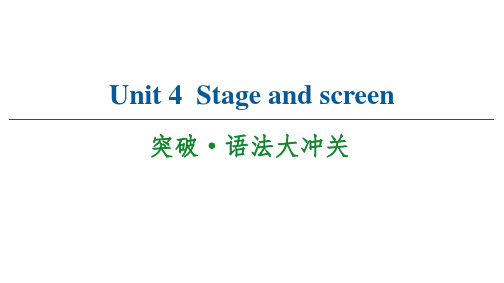
[即学即练 1] 完成句子
①由于我已经完成了所有的工作,我就坐下来休息一会儿。
Having finished all my homework ,I sat down to have a rest.
②这个男孩坐在门口,等着他妈妈回来。
The boy sat by the door, waiting for his mother to return
4.Not knowing(know) her address,we can't get in touch with her. 5.Though lacking (lack) a little confidence,he finished the speech successfully. 6.Being talked(talk) to,you should look into the eyes of the person. 7.Having been shown (show) around the Water Cube,we were then taken to see the Bird's Nest. 8. Having written (write) an important letter,I listened to the music for a while.
④Not having finished his homework,the boy was still doing it in the classroom.
⑤Having been told several times,he still couldn't understand how to operate the machine.
7.评注性状语 [观察例句] ①Generally speaking,children are naturally curious. ②Considering the budget,we have decided to give up the travel plan.
英语必修ⅱ外研版module4名师课件(共38张)语法和写作40页文档

英语必修ⅱ外研版module4名 师课件(共38张)语法和写作
11、战争满足了,或曾经满足过人的 好斗的 本能, 但它同 时还满 足了人 对掠夺 ,破坏 以及残 酷的纪 律和专 制力的 欲望。 ——查·埃利奥 特 12、不应把纪律仅仅看成教育的手段 。纪律 是教育 过程的 结果, 首先是 学生集 体表现 在一切 生活领 域—— 生产、 日常生 活、学 校、文 化等领 域中努 力的结 果。— —马卡 连柯(名 言网)
51、 天 下 之 事 常成 于困约 ,而败 于奢靡 。——陆 游 52、 生 命 不 等 于是呼 吸,生 命是活 动。——卢 梭
53、 伟 大 的 事 业,需 要决心 ,能力 ,组织 和责任 感。 ——易 卜 生 54、 唯 书 籍 不 朽。——乔 特
55、 为 中 华 之 崛起而 读书。 ——周 恩来
13、遵守纪律的风气的培养,只有领 导者本 身在这 方面以 身作则 才能收 到成效 。—— 马卡连 柯 14、劳动者的组织性、纪律性、坚毅 精神以 及同全 世界劳 动者的 团结一 致,是 取得最 后胜利 的保证 。—— 列宁 摘自名言网
15、机会是不守纪律的。——雨果
谢谢!
外研版高中英语必修二Book2Module4Grammar-动词-ing形式作主语、表语、定语、宾语补足语和状语
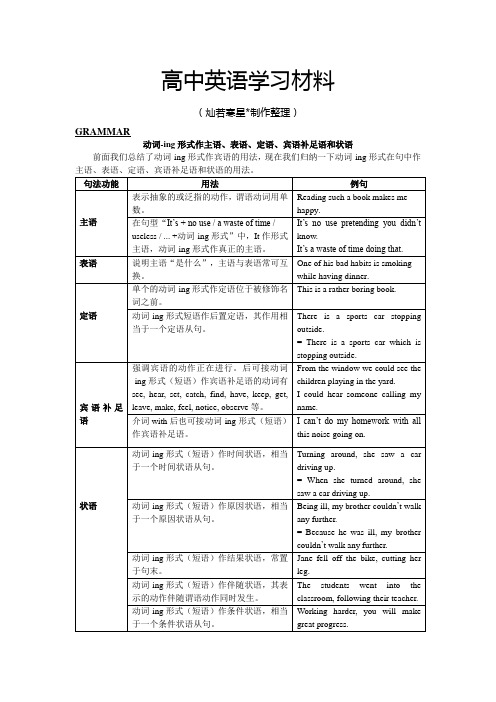
高中英语学习材料(灿若寒星*制作整理)GRAMMAR动词-ing形式作主语、表语、定语、宾语补足语和状语前面我们总结了动词-ing形式作宾语的用法,现在我们归纳一下动词-ing形式在句中作主语、表语、定语、宾语补足语和状语的用法。
句法功能用法例句主语表示抽象的或泛指的动作,谓语动词用单数。
Reading such a book makes mehappy.在句型“It’s + no use / a waste of time /useless / ... +动词-ing形式”中,It作形式主语,动词-ing形式作真正的主语。
It’s no use pretending you didn’tknow.It’s a waste of time doing that.表语说明主语“是什么”,主语与表语常可互换。
One of his bad habits is smoking while having dinner.定语单个的动词-ing形式作定语位于被修饰名词之前。
This is a rather boring book.动词-ing形式短语作后置定语,其作用相当于一个定语从句。
There is a sports car stoppingoutside.= There is a sports car which isstopping outside.宾语补足语强调宾语的动作正在进行。
后可接动词-ing形式(短语)作宾语补足语的动词有see, hear, set, catch, find, have, keep, get,leave, make, feel, notice, observe等。
From the window we could see thechildren playing in the yard.I could hear someone calling myname.介词with后也可接动词-ing形式(短语)作宾语补足语。
外研版高中英语必修2Module4_Grammar精讲精练课件
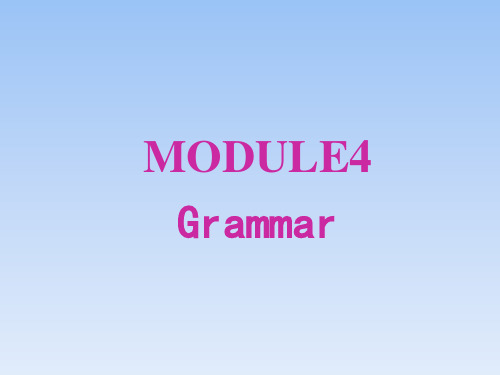
• 3 . He didn’t feel like________(work) , so he suggested________(spend)the day in the garden.
• 答案:working;spending • 4 . The doctor advised________(stay) longer in
________for another hour.
• A.waiting
B.to wait
• C.wait
D.to be waiting
• 解析:选A。mean doing “意味着”;mean to do“打算去做某事”。句意:错过这辆公共汽 车意味着再等一小时。
• 7.We regret ________that the film was not worth ________.
wish等
I can’t afford to go abroad.我没钱出国。
He has promised to
behave better from now on.他答应从今以
后要表现得好些。
形式
常用词
例句
动词 的ing形式
二者 均可 意义相同
Have you all
admit,advise,allow, finished doing the
one sitting. • 答案:to read
• 2.The twin brothers always enjoy (going/to go) to the concert.
• 答案:going
• 3 . It is necessary for older people (understand/to understand) what they think and feel.
- 1、下载文档前请自行甄别文档内容的完整性,平台不提供额外的编辑、内容补充、找答案等附加服务。
- 2、"仅部分预览"的文档,不可在线预览部分如存在完整性等问题,可反馈申请退款(可完整预览的文档不适用该条件!)。
- 3、如文档侵犯您的权益,请联系客服反馈,我们会尽快为您处理(人工客服工作时间:9:00-18:30)。
语 法 专 练
一.用动词的适当形式填空
1.Practise ____(put)your hand to the ground.
2.I can't help ______ (join in )the trip to Britain.
3.He didn't feel like _____(work) ,so he suggested____(spend) the day in the garden.
Module 4 Fine Arts--Western, Chinese and Pop Arts
•Grammar
-Ing form and the infinitive
复习: consider …..to be (as)….
with引导的复合结构作状语
Patterns
lively, live, alive,living Stand忍受 Style: n. 风格;样式;文体。
3. She likes reading newspaper
after supper .
宾语(object)
4. He may be in the reading room.
定语(attribute)
动名词作主语的固定句式 It is no use crying over split milk. It is no good waiting here. It is a waste of time persuading such a
4.That boy is crazy about
5.The man succeeded in
a. explaining things clearly.
b. buying the famous painting .
c. painting ,after many year. He reads a lot ,instead .
A. settling
B. to settle
C. settled
D. to be settled
Read the sentences below and decide if the following statements are true (T) or false (F).
1.Pop art aimed to show ordinary twentiethcentury city life.
7.Wo don't allow ______(smoke) in the office.
8.It's no use _____(sit) here waiting.
9.He pretended ____(listen) attentively.
10.The book is said___ (translate)into many languages.
c. Certain verb can be followed by an infinitive .
√T F
The function of the infinitive
1.To say is easy, but to do is
difficult .
主语(subject)
2.My dream is to go college some
2)To our joy, we found him still a_l_iv_e__after being missing for a week
3) The football game will be broadcast_l_iv_e__on CCTV-1.
1.With a lot of problems___B__, the newly elected president is having a hard time.
据说这本书已经译成许多语言
二.单项选择
1.She can’t help ______ the house because she’s busy making a cake.
A. cleaning B. to clean C.cleaned D. being cleaned
2.While shopping, people sometimes can’t help ____ into buying something they don’t really need.
consider /suggest/advise, look forward to ,excuse, pardon;
admit , delay/put off, fancy; avoid, miss, keep/keep on , practice; deny ,finish ,enjoy/appreciate; forbid, imagine, risk. can’t help, mind ,allow/permit , escape;
person to join us.
The function of the infinitive and the –ing form
作用 主语 宾语 表语 定语 状语 补语 种类
不定式 √ √ √ √ √ √
动名词 √ √ √ √ × ×
Underline the verb that can be followed by the –ing or the infinitive . The others can be followed both by the infinitive and the –ing. afford like mind avoid love remember suggest decide forget admit dislike mean try refuse stop practice aim to enjoy
1.The words followed only by the infinitive : afford decide refuse aim to
2.The words followed only by the –ing: mind avoid suggest admit dislike practice enjoy
day.
表语(predicate)
3.They wanted to help me . 宾语(object) 4.Would you like some to eat ? 定语(attribute)
5. They run over to welcome the foreign visitors. 状语(adverbial)
d. visiting the art gallery next week.
e. playing computer games .
1.The verb below by the infinitive when they are followed by a verb.
A
decide /determine, learn ,want, expect/hope/wish; refuse, manage, care, pretend ; offer, promise, choose, plan; agree, ask/beg, help.
Please remember to turn off the light when you leave .
Match the two parts of the sentengiven up
2.Our teacher Mr. Wu is good at
3.I looking forward to
√ a. When verbal phrases are followed by a verb ,the second verb must be the –ing form.
T
F
√ b. When verbal phrases are followed by a verb ,the second T F verb must be the infinitive.
4.The doctor advised ______ (stay) longer in hospital.
5.Michael has delayed _____ (write) to her till today.
6.The law forbids______ (sell) liquor(酒)to children.
3.The words followed only both by the –ing and the infinitive:
love remember forget mean try stop like
Translate the following sentences into English.
1.没有人能避免犯错误。 No one can avoid making mistakes. 2. 我买不起这辆小车。 I can’t afford to buy a car. 3.我在这儿吸烟,你介意吗? Would you mind my smoking here ? 4.我们应该拒绝毒品。 we should refuse to take drugs. 5.记住离开时需关灯。
考虑建议盼原谅,承认推迟没的想。
避免错过继续练,否认完成就欣赏。
禁止想象才冒险,不禁介意准逃亡。
Some certain verb expressions must also be followed by –ing form.
be/get used to , stick to, object to; lead to, devote to, look forward to add to, get to/get down to, pay attention to, can't stand, give up, feel like ,put off, be busy (in)
